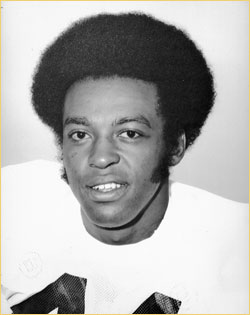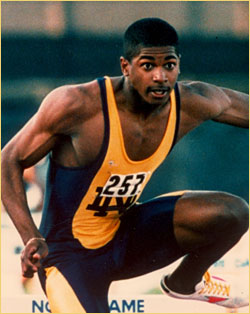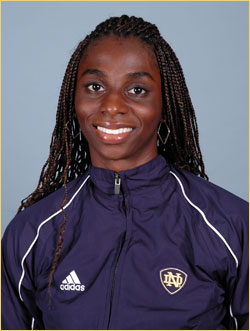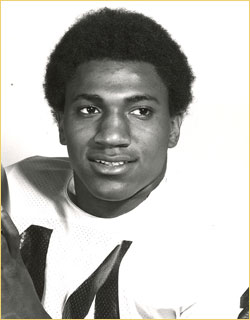Champions in Academics
Black student-athletes make an impact on the field and in the classroom
By Pete LaFleur
Notre Dame’s athletic tradition has included countless feats of excellence on the fields of play – but what sets that success apart from any other university is Notre Dame’s impressive collection of academic achievements by its student-athletes.
Several African-Americans over the past 40 years have graduated from Notre Dame with lists of accomplishments that touch both the athletic and academic realm. In particular, football players Thom Gatewood (a 1972 graduate) and Reggie Barnett (’75) and track stars Errol Williams (’98) and Maryann Erigha (’07) have been recognized with Academic All-America honors. Williams and Erigha also received Notre Dame’s prestigious Byron Kanaley Award, which annually honors a handful of student-athletes who are exemplary as students and leaders. Mid-’90s football player Marcus Thorne also was a Kanaley Award recipient, as was late-’60s track standout Bill Hurd (both to be featured in an upcoming football game program).

Tom Gatewood
|
GATEWOOD is one of 20 Notre Dame student-athletes ever to receive All-America, Academic All-America and NCAA Postgraduate Scholarship honors. The Baltimore native ended his college career as the Notre Dame recordholder for receptions in a season (77) and career (157), after combining with quarterback Joe Theismann to form a potent passing combination. A clever tactician when running his routes, Gatewood collected first team All-America and Academic All-America honors in each of his final two seasons. After graduating with a 3.6 GPA (as a sociology major), he played three NFL seasons with the New York Giants before spending the past 30-plus years working primarily with various media organizations.
Despite coming from a poor economic background, Gatewood was inspired by his parents (Thomas, Sr., and Wilhelmina) to become the first college graduate in his family.
“My mother would drill me with flashcards, spelling, handwriting, homework checks, study sessions and library trips,” recalls Gatewood. “She took me as far as her limited education could, and then encouraged me to seek extra credit. That was my first lesson in ‘stretching myself’ and would prove invaluable later in life. Mom understood how to praise, but she balanced it with presenting new challenges.
“My academic success would depend on a more diverse background, because my mom saw the world changing and wanted me ready. Teachings in the Bible came first in our home, and the spirit of someone or something greater than us always was present. Those teachings made me fearless and that has stayed with me.”
Gatewood is quick to point out that his parents were together in his youth – “not the norm in my community” – and remained a couple until his mother’s death. Thomas, Sr., was a construction worker with a sixth-grade education, but he nonetheless made a deep impact on his namesake.
“My father showed me the importance of a strong work ethic,” says the appreciative son. “He ultimately formed his own company, which was his dream. He recognized his shortcomings, but he was careful to let me see his gifts and his strengths, such as determination, drive, creativity, persistence, devotion to family, kindness, dependability, and acceptance of responsibility. I carried this model with me to Notre Dame and beyond.”
Gatewood similarly benefited from attending Calverton Junior High School – an experimental, college-prep school with an integrated faculty and student body that allowed him “to see the world through the eyes of people of other races and backgrounds.” He graduated from Calverton with honors and headed off to the college-prep Baltimore College High School, where he was urged by three friends (Terry, Jake and Gregory) to join them and 600 other boys at football tryouts. Despite no previous football experience, Gatewood made the team and ultimately earned prep All-America honors.
He also graduated from BCHS with high honors and gravitated towards Notre Dame, through the guidance of high school coaches George Young (later the general manager of the New York Giants) and Mel Filler. Gatewood was attracted to many factors at Notre Dame – “high academic standing, strong graduation rate for athletes, top-10 football team ranking, national TV and radio exposure, national network of alums and subway alums, and a student population that was diverse and challenging” – and he eagerly headed off to northern Indiana in the fall of 1968.
Gatewood was influenced by numerous people at Notre Dame, among them head coach Ara Parseghian. The legendary Irish coach shifted Gatewood (#44) from running back to receiver, ultimately helping to rewrite the program’s record books.
“Over those four years, Ara’s teachings sunk in for me,” says Gatewood. ” I watched him in that platform above practice and that bird’s-eye view would teach me about perspective. He taught me how to see the whole field and stressed how important it was to learn every position, to know how the team functioned. I was not the fastest or strongest, but coach always said I was the smartest – and he made me that way.”
Off the field, Gatewood’s favorite class was Donald Barrett’s sociology course that helped him learn “the power of observation and how to analyze human behavior.” He also was able to overcome shyness through classes in the communication arts department, which exposed him “to the true power of the spoken word and gave me a new confidence.” Former sports information director Roger Valdiserri’s media-education workshops likewise helped Gatewood develop composure during interviews and laid a path for a postgraduate career that has included sales executive positions at Continental Can, Reader’s Digest, Mutual Broadcasting, RKO Radio Network and Satellite Music Network, plus media positions with ABC Sports & ABC News (as a college football announcer and associate director). He currently is owner of Blue Atlas Productions, a promotional products distributor in New York.
Gatewood has fond memories of dorm life “amongst regular students” at Notre Dame. “That is where the idea and cultural exchange occurs,” he says. “You meet classmate’s parents and siblings, and learn about life after college. The real lesson in diversity is learning about customs, language, heritage and other dreams. It was an exchange, a major part of my education, and I treasure those moments.”
A current resident of Nutley, N.J., Gatewood and his wife Susan have a daughter Jessyca (a school teacher in Connecticut) and a grandson Algiers. Gatewood’s spare time includes providing youth tennis lessons and working with the Healthy Directions organization that aims to increase awareness about the dangers of childhood obesity.

Errol Williams
|
WILLIAMS was born in Kingston, Jamaica, before moving with his family to Lauderhill, Fla., as an eight-year-old. He went on to set records at Boyd Anderson High School in the 55- (7.26) and 100-meter hurdles (13.65) while helping win the first track-and-field state title in the program’s history. That success continued at Notre Dame, where Williams set team records in both hurdle events (7.26 in 55-meter indoor; 13.53 in 100 outdoor), won BIG EAST titles at both distances, broke the tape first at the prestigious Drake Relays (in the 110), and posted All-America NCAA hurdle finishes of eighth in the 55 (’97) and third in the 110 (’98).
The two-year team captain – nicknamed “Errol-stotle” by admiring teammates – was a hardworking leader and eight-time Dean’s List student who graduated with a 3.71 cumulative GPA as an accounting major. His numerous honors included first team Academic All-America and the BIG EAST Conference Scholar Athlete of the Year (which included a postgraduate scholarship). An active participant in various service activities, Williams was named to the 1996 NCAA Academic Integrity Committee and the BIG EAST Leadership Committee, in addition to receiving Notre Dame’s Dean’s Award for Leadership. He is one of four Notre Dame student-athletes ever to receive both the Byron Kanaley Award (for exemplary students and leaders) and the Chris Zorich Award, which recognizes excellence in community service involvement. He served on Notre Dame’s Monogram Club board of directors from 2000-03.
Williams credits his parents, Errol and Pamela, with creating an environment of “very supportive discipline” that laid the foundation for his overall work ethic and academic focus. “My parents made it clear that no one would hand me success and – if I wanted it – I’d better work for it,” says the two-time All-American.
While at Boyd Anderson, Williams trained under track coach David Bowden, who quickly laid down the law while sending a valuable lesson. “I missed practice once in my freshman year and coach Bowden made such a big deal of it that I never missed a day again,” recalls Williams. “He taught me how important it was to show up everyday.” A few years later, Williams was blown away by his freshman-year roommate, Ryan Soose.
“Ryan was the hardest-working guy I’d ever been around and showed me that making it at ND would take a lot of work,” says the thankful former roommate. “He woke me up to how intense it would be there.”
With his work ethic firmly established, Williams went on to excel in the classroom at Notre Dame – clearing academic hurdles as adeptly as he did the obstacles on the track. Williams cites his first-year theology class (with Jerome Neyrey) as his favorite class at Notre Dame, while the toughest course was Father George Wiskirchen’s introduction to jazz.
“I loved learning about Biblical history from such a strong intellectual point of view,” says Williams. “With a courseload of calculus, accounting, etc, one of my toughest classes was the jazz class. I had no musical background and was working a very different part of my brain. Ten years later, I still love jazz and appreciate the music so much because of that course.”
Williams spent his first postgraduate year working as an auditor for Pricewaterhouse Coopers, followed by two-plus years as a senior accountant with the Department of Housing and Urban Development (HUD). He then received his MBA from the Harvard Business School (in ’05), where he benefited from a HBS scholarship for Notre Dame graduates that was established by the Carey family. Williams has spent the past three years working in Atlanta, as an engagement manager for McKinsey & Company, and he hopes to make a return to coaching high school track and field (as he did for a couple years after graduating from Notre Dame). He and his wife are the parents of three boys, each of whom recently visited Notre Dame for their father’s 10-year reunion.
When he looks back at the lessons he learned at Notre Dame, Williams stressed three words: “discipline, discipline, discipline.”
“It’s impossible to be a student-athlete at Notre Dame without serious time management,” he says. “I’ve learned how to handle several real priorities at the same time, without having to sacrifice too much in one area. That has helped me keep family and faith as big parts of my life, despite a busy worklife. Sometimes it’s a real challenge, but one I’m capable of meeting thanks to my experiences at Notre Dame.”

Maryann Erigha
|
ERIGHA earned all-BIG EAST honors 15 times in her career – the most ever by a Notre Dame track-and-field competitor – highlighted by BIG EAST titles in the outdoor 100-meter dash (’05) and the indoor 60-meters (’06). She was a four-year NCAA Mideast Regional entry in the 200 meters and ran the 100 at that event three times. As a sophomore in 2005, Erigha qualified for the NCAA finals in the 100 and 200 but was unable to compete due to injury. Her name is listed throughout the Notre Dame sprint record books, most notably a personal-best time of 7.38 seconds in the 60-meters (tops in the program’s history).
A double major in sociology and computer applications, Erigha graduated with a 3.83 GPA and was named a second team Academic All-American. She also received Notre Dame’s highest student-athlete honor (the Kanaley Award) and was presented with an NCAA Postgraduate Scholarship, joining four previous Notre Dame track-and-field performers (three men, one woman) in that high distinction.
Erigha’s parents, John and Esther, created a home environment in Stone Mountain, Ga., that encouraged their daughter’s academic vigor. “There were always things to read around the house – newspapers, magazines, fiction novels,” she says. “When I was bored, I would pick up something to read.
“I guess my curiosity in school and learning new things stems from always having something new to discover in childhood. My coaches always said that if you didn’t do well enough in class, you wouldn’t be eligible to compete and then all anybody would expect you to do was study. So that logic also motivated me.”
The spring semester typically poses the greatest challenge for track athletes, as they try to balance their academic load with the meet schedule. Despite that challenge, Erigha posted a 4.0 GPA in both the 2006 and ’07 spring terms.
“During the outdoor season, we would travel frequently, sometimes back-to-back weekends,” says Erigha. “I tried to get most of my work done beforehand, since it was hard to focus on running a race if I had the daunting task of completing a paper in the back of my mind.
“It’s even more challenging to balance athletics and academics during finals. One year, we returned from the BIG EAST conference meet after 2:00 a.m., only to have a final exam at 8:00 a.m. After the exam, I caught up on some much needed sleep.”
Erigha is in the midst of her second year at the University of Pennsylvania, enrolled in the sociology doctoral program. She also is serving as a teaching assistant and a graduate advisor in the residence halls at Penn.
“Being a Notre Dame student-athlete, I realized that it was possible for me to do more than one thing at a time and still succeed,” says Erigha. “I learned to balance multiple responsibilities and that carries over to graduate school, where I have to simultaneously take classes, conduct research, and assist in teaching. In addition to being fun and challenging, running track at ND also was a needed break from the academic pressures of college.”

Reggie Barnett
|
BARNETT was an All-America football player at Flint (Mich.) High School, where he also finished second in the state 100- and 220-yard sprints. A three-year starting cornerback at Notre Dame, Barnett was known for his deep-coverage ability and played on the 1973 national championship team as a junior. He capped that season by turning in an MVP performance at the 1974 Orange Bowl, with his late interception helping seal that 13-11 win over Alabama.
After nearly graduating from Notre Dame in three years, Barnett collected 1974 Academic All-America honors as a senior – when his 21-credit, in-season courseload included several graduate-level classes. He completed his undergraduate economics degree with a 3.64 cumulative GPA and went on to receive his MBA and law degree (’79) from Duke University.
Barnett’s mother Dora was a teacher and naturally had a “huge influence” on his academic growth, as did a Walker Elementary teacher by the name of Miss Hamilton. “She was ex-military and was tough on me in class.” says Barnett. “She demanded a lot and helped get me focused.”
While cycling through the classrooms at Notre Dame, Barnett had the pleasure to take Bill Leahy’s economics class in addition to enjoying the statistics class taught by a “very intelligent fellow,” Gregory Kurme. He also struck up a quality friendship with academic advisor (and legendary fencing coach) Mike DeCicco, with the two having a regular Friday chat at DeCicco’s office (at that time, located in the Golden Dome administration building).
“No school offered as good of an opportunity for me as Notre Dame,” says Barnett, who worked for the department of the interior during the summer before his senior year, analyzing computer sheets of economic problems in the shadow of Capitol Hill. “It was a great situation to receive a quality education while playing for a top football team. I was blessed to spend four years there.”
Barnett went on to work 27 years for IBM before recently becoming a regional manager for Surfray, a technology search engine that is a competitor of Google. He also is co-owner of Wireless Resource Corporation (Madison Hts, Mich.), which provides wireless infrastructure to a variety of clients (including hospitals and public buses).
Despite holding great memories from his days at Notre Dame, Barnett regrets falling out of touch with classmates and teammates, saying, “I got to be an old man quicker than I thought I would.” He also recently endured the pain of seeing fellow Academic All-American Pete Demmerle succumb to Lou Gehrig’s Disease (a.k.a. ALS). Demmerle – a double major in English and Spanish – had combined with Barnett to make Notre Dame the only football team with multiple first team Academic All-Americans for the 1974 season.
“I lived in Sorin Hall with Pete and got to know him real well,” recalls Barnett. “He did a great thing later in life, helping me get a promotion with IBM. The man who interviewed me had played high school football with Pete, who put in a good word for me. It was just a tragic thing for us to lose Pete like that, sometimes bad things happen to good people.”
Barnett and his wife Bernadell have two daughters, Melissa (a junior at Hampton University) and Meredith, a high school sophomore. He hopes that his children benefit as much from their educational experiences as their father did.
“When you look back at Notre Dame, you think of the relationships and friends – there were a lot of good people there,” says Barnett, whose diverse hobbies include world travel, golf and art collecting.
“Notre Dame gave me a good base to move forward, ranging from analytical skills to writing and speaking ability. Those are things that can’t be taken away from you, and in tough times you often have to fall back on your skills. So I’m very grateful to Notre Dame and what is has meant to me in my life.”






